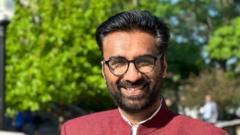Badar Khan Suri, a scholar specializing in conflict studies, has been caught in a legal maelstrom after his arrest on March 17 in the United States on charges related to terrorism. His situation is intricately tied to his past experiences and personal life, particularly a humanitarian trip to Gaza that he undertook with academic peers back in 2010. This trip to the Palestinian region, controlled by Hamas and under Israeli blockade, significantly influenced Suri’s professional trajectory, including a marriage to Mapheze Saleh, a Palestinian-American.
The scholar's arrest follows a tweet from Tricia McLaughlin, Assistant Secretary of the Department of Homeland Security, asserting that Suri is being detained due to his close associations with a known figure linked to Hamas—an assertion he vehemently denies. Although Suri entered the U.S. legally, this incident has raised alarms about the U.S. government's increasingly harsh stance on activists and academics who support Palestinian causes in light of a broader policy under former President Donald Trump, which aimed to crack down on illegal immigration and alleged antisemitic activity in the academic arena.
Back in India, where he attended Jamia Millia Islamia University, Suri is remembered fondly by teachers and classmates as a thoughtful and engaged scholar, boasting a rich understanding of global conflicts. His history highlights a deeper irony; India has supported the Palestinian cause over the years while establishing stronger ties with Israel—placing individuals like Suri in a complicated position within the geopolitical discourse.
Supporters emphasize that engaging academically with the Palestinian struggle should not equate to being complicit with terrorist organizations. Suri's professor expressed doubts about the validity of the claims linking him to Hamas, underscoring that advocacy for victims of conflict is part of responsible scholarship, not criminal behavior.
Suri's path converged with Saleh during the 2010 caravan trip, a journey that provided them both with firsthand insight into the ongoing suffering within Gaza. They married in 2013, and while Suri pursued his academic career, Saleh found opportunities within the Qatar embassy and pursued a master's degree. Their life together continued to intertwine studies with activism until Suri’s abrupt arrest disrupted their plans.
Currently, Suri’s father is advocating for his son, pointing out the lack of evidence to substantiate the allegations against him and explaining that Suri’s connections to Palestine stem merely from his marriage, not any unlawful activity. As the legal battles unfold, many continue to rally support for Suri, emphasizing the importance of allowing academic voices like his to engage in crucial global dialogues surrounding conflict and humanitarian aid.
The scholar's arrest follows a tweet from Tricia McLaughlin, Assistant Secretary of the Department of Homeland Security, asserting that Suri is being detained due to his close associations with a known figure linked to Hamas—an assertion he vehemently denies. Although Suri entered the U.S. legally, this incident has raised alarms about the U.S. government's increasingly harsh stance on activists and academics who support Palestinian causes in light of a broader policy under former President Donald Trump, which aimed to crack down on illegal immigration and alleged antisemitic activity in the academic arena.
Back in India, where he attended Jamia Millia Islamia University, Suri is remembered fondly by teachers and classmates as a thoughtful and engaged scholar, boasting a rich understanding of global conflicts. His history highlights a deeper irony; India has supported the Palestinian cause over the years while establishing stronger ties with Israel—placing individuals like Suri in a complicated position within the geopolitical discourse.
Supporters emphasize that engaging academically with the Palestinian struggle should not equate to being complicit with terrorist organizations. Suri's professor expressed doubts about the validity of the claims linking him to Hamas, underscoring that advocacy for victims of conflict is part of responsible scholarship, not criminal behavior.
Suri's path converged with Saleh during the 2010 caravan trip, a journey that provided them both with firsthand insight into the ongoing suffering within Gaza. They married in 2013, and while Suri pursued his academic career, Saleh found opportunities within the Qatar embassy and pursued a master's degree. Their life together continued to intertwine studies with activism until Suri’s abrupt arrest disrupted their plans.
Currently, Suri’s father is advocating for his son, pointing out the lack of evidence to substantiate the allegations against him and explaining that Suri’s connections to Palestine stem merely from his marriage, not any unlawful activity. As the legal battles unfold, many continue to rally support for Suri, emphasizing the importance of allowing academic voices like his to engage in crucial global dialogues surrounding conflict and humanitarian aid.



















